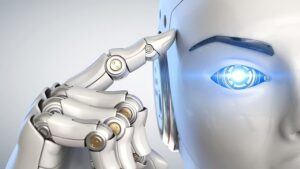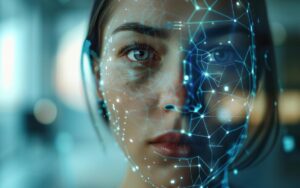Artificial intelligence has created a lot of chatter in the last few months, making it a hot topic and prompting many questions. Machine learning has also created plenty of conversation over the past few years, especially in areas like self-driving cars and chatbots. Conflating the two terms is tempting, but how similar are they? Is machine learning AI?
This article answers the question, “What is the difference between AI and machine learning?” We will also call out the benefits of using artificial intelligence and machine learning, their applications, and online AI ML programs you can take to gain professional skills.
But before we explore how machine learning is related to artificial intelligence, let’s establish a few definitions.
What is Artificial Intelligence?
Artificial intelligence, or AI for short, is a field of computer science software that imitates human cognitive abilities to perform complex tasks that people typically could only perform, including data analysis, decision-making, and language translation. So, AI is code specifically designed to do work that needs human reasoning. In the past, automated systems and machines performed their duties by following instructions (programming) and repeating tasks without change. With AI, machines use algorithms and can learn from their interactions, performing better as time passes.
For the TL/DR crowd, AI lets computers behave autonomously and intelligently versus just doing what they’re told.
Okay, so we know what artificial intelligence is. Let’s take it one step further and explore what is machine learning in AI.
Also Read: How Does AI Work? A Beginner’s Guide
Is Machine Learning AI? What is Machine Learning in Artificial Intelligence?
Machine learning, or ML for short, is a sub-field of AI empowering machines to learn from past information and experiences without human intervention or being explicitly programmed.
Artificial intelligence is, in fact, an umbrella term that covers a handful of distinct but interrelated sub-fields. They are:
- Deep Learning. DL covers artificial neural networks (ANNs) that imitate the human brain to perform increasingly complex reasoning tasks independently.
- Natural Language Processing. NLP, considered a subset of AI, ML, computer science, and linguistics, creates software that can interpret human communication.
- Robotics. Robotics is a subset of AI, electrical engineering, and computer science that emphasizes the creation of robots that can learn and perform complex functions in the real world.
- Machine Learning. And, of course, there’s machine learning, which, as we already discussed, is a sub-field of AI where algorithms are trained with data sets to become models that can accomplish specific tasks.
So, a machine learning model is a function that learns by sifting through enormous amounts of data (typically, big data) and gets more brilliant as it works, evolving as it’s exposed to newer information. Traditional software can’t do this.
So, is machine learning artificial intelligence? Yes, in that it falls under the broad category of AI. But whereas all ML is AI, not all AI is ML. Now, let’s see how machine learning relates explicitly to artificial intelligence.
How is Machine Learning Related to Artificial Intelligence?
Both fields are closely related; unsurprisingly, they’re often mistaken for each other. Just remember that artificial intelligence is the broader concept, allowing systems and machines to act, sense, reason, and adapt like humans. In contrast, machine learning is the narrower field that lets machines pull knowledge from massive data sets and learn autonomously.
So, is machine learning AI? Yes, it is.
Now, let’s list some specific differences between AI and machine learning. You will see that these two fields are distinct, although some of the differences are subtle.
What Are the Primary Differences Between Artificial Intelligence and Machine Learning?
This chart provides a side-by-side comparison between artificial intelligence and machine learning.
| Artificial Intelligence | Machine Learning |
| AI technology lets machines simulate human behavior. | ML technology is an AI subset that lets machines automatically learn from past data without human intervention. |
| AI aims to make more intelligent computer systems that solve complex problems like humans. | ML empowers machines to learn from past data to generate accurate output. |
| AI makes intelligent systems that perform tasks as people do. | ML uses data to teach machines to perform designated tasks and provide accurate results. |
| AI has a broad scope that focuses on maximizing the chances of success. | ML is a limited field that focuses primarily on accuracy and patterns. |
| AI is primarily used in chatbots, online games, intelligence robots, and digital assistants such as Siri. | ML is mainly used for things like Google search algorithms, online recommendation systems, social media auto-tagging, etc. |
| AI uses learning, reasoning, and self-correction. | ML features learning and self-correction when exposed to new data. |
Also Read: Machine Learning Engineer Salary: Trends in 2023
The Benefits of Using AI and ML
Fortunately, when it comes to using artificial intelligence and machine learning, it’s not an either/or proposition. Here are some benefits that many organizations can enjoy if they use artificial intelligence and machine learning together.
- Organizations can analyze and activate a more comprehensive range of structured and unstructured data sources
- Employees are empowered by applying predictive analyses and insights into their business applications and reporting
- Employees can make more informed decisions faster thanks to improved data integrity, accelerated data processing, and human error reduction
- AI and ML together increase operational efficiency while reducing costs
Is Machine Learning AI? Joint Applications of AI and ML
Where can we apply all the fantastic benefits of teaming up artificial intelligence with machine learning? Here are a few real-world applications of combining AI and ML.
- E-commerce and retail. The most recognizable everyday use of AI/ML is recommendation engines, those wonderful messages you get for days after you purchase something online. However, the artificial intelligence/machine learning combination is also valuable for inventory and supply chain optimization, forecasting future demand, visual searches, and personalized offers and experiences.
- Healthcare. AI and ML can be used for augmented diagnostics, patient health record analysis and insights, accelerated drug development, outcome forecasting and modeling, patient monitoring, and extracting information from clinical notes.
- Manufacturing. An effective AI/ML combination is valuable for monitoring production machines, predictive maintenance, operational efficiency, and IoT analytics. The latter is especially vital due to the explosion of the Internet of Things popularity. The AI/ML team-up can address the challenges of rampant IoT growth without sacrificing quality or response time.
- Supply chains. As supply chains become increasingly globally interconnected and complex, so do the possible setbacks, stalls, hiccups, and breakdowns they face. An occasional global pandemic is thrown in to make things even more interesting. To ensure speedy deliveries, many supply chain managers and analysts increasingly rely on AI-enhanced digital supply chains that can track shipments, forecast delays, and solve problems on the fly.
- The financial sector. The financial world benefits from AI/ML mashups in applications like fraud detection, risk assessment and analysis, automated trading, and optimizing service processing.
- Telecommunications. A compelling mixture of artificial intelligence and machine learning can be leveraged for business process automation, intelligent networks and network optimization, predictive maintenance, capacity forecasting, and upgrade planning.
Do You Want to Learn More About Artificial Intelligence and Machine Learning?
Both artificial intelligence and machine learning are complex and challenging. Hence, the more skilled you are, the better you can navigate their complexities and get the job done. The field is growing and needs professionals. For example, the global artificial intelligence market was valued at $136.55 billion last year in 2022 and is now projected to increase at a compound annual growth rate (CAGR) of 37.3 percent in the seven-year period between 2023 and 2030. The continuous AI/ML research and innovation guided by today’s tech giants drives advanced technology adoption in industry verticals like the automotive industry, finance, healthcare, retail, and manufacturing.
Whether you’re interested in starting in artificial intelligence or machine learning, or you’re already an AI or ML professional who wants to upskill, the following two courses can help round out that skill set and take your technical understanding to the next level.
This AI/ML course is a post graduate artificial intelligence and machine learning program. The program teaches Python, machine learning, natural language processing, and more through six months of engaging virtual classes and over two dozen practical projects.
There is also this 24-week, challenging AI ML bootcamp, which perfectly complements the previous program. This bootcamp teaches valuable IT industry-related skills such as machine learning, generative AI, deep learning, computer vision, NLP, reinforcement learning, prompt engineering, ChatGPT, and more. Like the AI/ML course, this bootcamp offers over 24 hands-on projects.
According to the Glassdoor.com website, AI/ML engineers in the United States make an average of $167,059 annually. So, if you’re ready to tackle the challenges of artificial intelligence and machine learning, sign up for one (or both) of these fantastic programs and get the skills you need to make an impact in this fast-growing field.
FAQ
Here are some of the most popular questions regarding artificial intelligence and machine learning.
What is the chief difference between artificial intelligence and machine learning?
Artificial intelligence focuses on making intelligent computer systems that can solve complex problems like humans. In contrast, machine learning lets machines learn from big data to produce accurate output and results.
Is AI machine learning?
No. But machine learning is AI. AI is the larger category, an umbrella term under which ML resides.
Are the fields of AI and ML promising careers?
Absolutely. More industries are increasingly adopting both technologies, so the demand for AI and ML professionals continues to rise. Recent employment surveys show a significant annual growth rate over the next decade.






